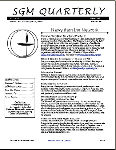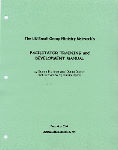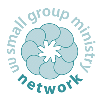We recently started five new covenant groups at Chalice Congregation, near San Diego, California. We were aided greatly in our facilitator training by using the UUSGM Network's Facilitator Training and Development Manual, developed by Susan Hollister and Diana Dorroh. The manual comes with a CD, so we only had to download the manual and make any changes we wanted to fit our needs and ideas. So easy! We used all the information to train our facilitators and also used other hand-outs to acquaint new group members with what a covenant group is, as well as giving them other preliminary information. We continue to use it for samples of covenants, topic outlines, and service project ideas. Thank you so much for your hard work in putting this together!
December 2009
| |||||||||||
|
Covenant Group News is an interactive Small Group Ministry and Covenant Group newsletter read by 1300 forward-looking Unitarian Universalists. CGNews is distributed by the UU Small Group Ministry Network. Visit us online at http://www. You may automatically unsubscribe from this list at any time by visiting the following URL: http://www. In This Issue
Join the Network
If you are not already a member, please join the Network and make sure your congregation is a member. The UU Small Group Ministry Network facilitates networking among SGM practitioners and makes current, practical information and resources available to ministers, program coordinators, and facilitators. Your membership funding will enable us to continue this important work.
Download a Membership form: http://www.
Individual and congregational memberships are our major source of revenue.
The Network is financially independent of the UUA.  Letter from the Editor
Letter from the Editor
I hope you have all had wonderful holidays and, as 2010 begins, are thinking about how to make your individual covenant groups and small group ministry programs better. Please share your ideas, questions, and experiences with the other 1300 subscribers. Send them to me at diana_dorroh@hotmail.com. Coordinators, if you send me the email addresses of your facilitators, we can put them on the distribution list for Covenant Group News. They can unsubscribe at any time, of course. We have some comments on facilitator training from UU SGM Network Board member Christine Trigeiro. It's great to hear that the Facilitator Training Manual Susan Hollister and I wrote last year is being put to good use. You can order your copy from the Network website: http://www.smallgroupministry.net/forsale.html. Anne Haynes, from the UU Church of Bloomington, IN, and also a UU SGM Network Board member, submitted comments on the relationship between Small Group Ministry and pastoral care. This is relevant to my November question about the reasons for implementing Small Group Ministry. Thanks, Anne. From Linda Griffin, Small Group Ministry Facilitator and Coordinator at the UU Fellowship of Briarcliff, Croton, and Ossining, NY, we have a wonderful list of Tips for Facilitators. And, finally, we have some answers to the November question from David Throop, Bay Area UU, in Houston, TX. David asks about ways to organize ushering and greeting and wonders whether anybody has a special service-oriented covenant group that focuses on ushering. The first answer is from Dottie Kelly, one of the group leaders at my own congregation, the Unitarian Church of Baton Rouge. The second answer is from me. I've also had some good conversations with David about the need for district training in "how to run" a small group ministry program. The UU SGM Network's main solution for learning how to run a Small Group Ministry program is for the congregation to send a team to our Summer Institute. In 2010, it will be at Camp deBenneville Pines, Angelus Oaks, California and will be jointly sponsored by the Network and the Pacific Southwest District. Registration materials will be available in January from the Network website: www.smallgroupministry.net. I will begin the exploration of Ministry Objectives for small group ministry programs in January. I began thinking about the topic after reading The Seven Deadly Sins of Small Group Ministry: A Troubleshooting Guide for Church Leaders by Bill Donahue and Russ Robinson. Donahue and Robinson list "unclear ministry objectives" as the first deadly sin. They are concerned with whether a church has a program "with" small groups or is a church "of" small groups. That is, is it one of many programs or is it a program in which most of the congregation is expected to participate? I am also interested in the variety of reasons UU congregations have for starting small group ministry and whether the programs meet these expectations. Why did your church begin its small group ministry program? Has the program provided the benefits you intended? If you've had a program for a while, have those reasons changed over the years? I'd like to compile a complete list of reasons for implementing a small group ministry program. The Winter 2010 SGM Quarterly will be mailed to members in early February, packed with articles by and for coordinators, ministers, and facilitators. If you are a Network member, you will receive a copy. If not, why not join now and receive this winter issue. http://www.smallgroupministry.net/membership/index.html. PayPal makes it easy to join or to renew your membership. You can check on our website to see whether your congregation is a Network member. http://www.smallgroupministry.net/membership.html. We are financially independent of the UUA and depend upon membership and publications sales to cover our modest expenses. We offer a member discount of 40% off all our UU SGM Network publications. See a list of publications below. The Network website, http://www.smallgroupministry.net, contains information about the UU Small Group Ministry Network, articles by leaders in the Small Group Ministry movement and sessions that people have contributed, as well as a complete archive of Covenant Group News and the SGM Quarterly. It is updated twice a month. The focus of the December updates is session plans. In early December, we added new sessions from Chapel Hill, NC (two), Augusta, ME (two), and Germantown, MD (one). Countryside Church UU, Palatine, IL has submitted several groups of session plans and other materials. About a dozen of the plans were added early December. We previously had about 30 of the session plans submitted by Rev. Glenn Turner bundled as Volume 1 and Volume 2. We had a request to have these as separate files. This has been done. For the web update that will be done within the next few days, there are additional session plans from Palatine, as well as an archived collection of twenty sessions from Bremerton, WA. Our publications committee would like to hear from you about UU SGM Network publications (listed and described below): Thanks to Anne Haynes, UU SGM Network Board member from the Unitarian Universalist Church of Bloomington, IN, for proofing this edition and to Network Board members Susan Hollister and Rev. Helen Zidowecki for providing comments. In faith that we're making this a better world,
Comments on Facilitator Training
Christine Trigeiro, Chalice Circles Program Coordinator Chalice Congregation, San Diego, CA
Comments on Small Group Ministry and Pastoral Care
From Anne Haynes, UU Church of Bloomington, Bloomington, IN Diana, interesting what you said about using SGM to help with pastoral care. We've recently formed an Elder Task Force, which recruits volunteers to sign up to visit people in nursing homes and shut-ins in our congregation. And we have a separate Caring Committee that takes care of people by taking food or running errands for anyone in the congregation with emergency situations, and preparing receptions for memorial services. So we aren't technically using SGM for pastoral care, but we've found that a lot of people find it's a good substitute for pastoral care in terms of needing company or someone to talk to about their problems, crises, or joys. And if someone in a Chalice Circle has a baby, dies, has to move suddenly, or is ill (all of which have occurred), their Circle really pitches in to help with these situations, as would be expected.
Tips for Facilitators From
Linda Griffin, Small Group Ministry Facilitator and Coordinator, UU Fellowship of Briarcliff, Croton, and Ossining, NY My Community Circle Group had been going strong for over four years. Below are some suggestions for helping your group become a cohesive unit. Remember, it takes time for groups to develop trust, so if your group is new or hasn't yet bonded, choose topics that are not too personal. BEFORE THE MEETING On occasion, group members are asked to submit questions they would like included in the discussion. I have found that asking for participation in advance of the discussion encourages people to attend the meeting. Here is an example of what happened when I asked my group for additional questions on the topic of clutter. Hi Linda, Send a reminder two days before the meeting. Include a catchy quote related to the topic. THE MEETING During the discussion part of the meeting, ask a topic question to pull everyone back when the conversation gets off track. Sometimes it's helpful to suggest that extraneous discussion be continued after the meeting. Also, group members are always asked if they would like to add anything to the discussion before the meeting ends. AFTER THE MEETING An email with a brief summary of the discussion is sent immediately to group members who were absent. Included is a personal message about how they were missed. A group member who appears unusually distant or upset during the discussion receives a phone call. Emails are sent to individuals thanking them for their helpful or insightful comments. Showing concern and appreciation when warranted goes a long way in keeping the group together. If time is an issue, the facilitator can delegate other group members to make calls or send emails. Birthdays are acknowledged with a birthday cake. Holidays are celebrated with decorations and special food. When a member left the group to move to Canada, each of us wrote something special about the person on an index card and put the cards in a pretty package to give to her at the last meeting. We presented the departing member with a group gift as well. In addition, together we helped our Fellowship with fundraising activities. This year we worked with The Green Sanctuary committee to set up its first Sustainability Fair. These activities bring our group closer to each other and to the larger fellowship. ADDING NEW MEMBERS THE CHALLENGING GROUP After the food tirade experience, I decided to write the topic questions on a large piece of paper so those who have difficulty hearing can see the questions we are talking about. There are a couple of people who feel reluctant about participating, one because she had a stroke and is self-conscious about speaking, and the other because she feels she has little to contribute. I made a point of privately complementing them both for their limited participation by stating specific things they added to the discussion. Both women are now regulars and enjoy the discussion group. The Discussion Circle has been an enriching experience for all participants. Many of the women moved to the senior residence recently, and this is a way for them to share their life stories and make new friends. You may not have time to act on all of these suggestions, but doing a few of them some of the time can help your group prosper. Good luck!
Repeat of the Question from David Throop
Bay Area Unitarian Universalist Church, Houston, TX Do you have a model on how to start a Covenant Group (CG, our name for our Small Group Ministries) for those doing service to the church? Some background: We're a ~ 340 member church. We have ~15 active CG, with 100+ adults participating in at least one CG in the last 3 months. We have two Sunday services. When Rev Bob Hill planted the Covenant Group program at our church, 10 years ago now, he highly recommended the Carl George books on small group ministry. George's books mention SGMs for groups who volunteer for the church - the team that helps with the parking, the ushers, and the greeters - but gave no special instructions on setting them up. His examples, such as they are, describe Bible Study groups. Our church has chronic trouble staffing the ushers and greeters slots. It's our intention to have (4 ushers + 2 greeters) x 2 services = 12 slots per Sunday. We have two couples who often volunteer for both services. We can actually sort of get by with as few as 1 greeter and 1 usher, but it limps and makes us a less welcoming congregation than we'd like to be. Our Membership committee chair emails out a sign-up to a list of about 30 members, but few people respond. Hey, we're a UU congregation near NASA and we've got many introvert members who find ushering / greeting uncomfortable. And they don't find it rewarding. Is there a way we could make it more rewarding by structuring the ushering / greeting as a Covenant Group? Has anybody else done this? How do you structure it? What about existing volunteers who don't want to join a small group?
Response from Dottie Kelly,
Unitarian Church of Baton Rouge, LA We at the Unitarian Church of Baton Rouge, LA depend on our Branches groups (covenant groups) for ushering/greeting and chancel flowers at two services weekly. We have 20 groups and in the covenant of the groups it states "we affirm our connection to the church through our service on Sunday morning and by working together on a church or community project". Through rotation each branches group could possibly serve only once every year and a half. However, often two branches groups will split a month to assure full coverage. There are introverts here too who do not like to walk down the aisle and pass the basket for the offering, so they often choose to supply the flowers. The main point is that everyone has a chance to participate in some way and it is a team project. The primary greeting at our church is done in a covered breezeway before a person enters the foyer. These volunteers are extrovert by nature, enjoy welcoming and choose this as their niche of service. The ushers therefore are not alone; we are using the varying strengths of all. We have not found it healthy to start covenant groups with specific criteria. Part of our members' spiritual maturity is affirming the inherent dignity of all people by getting to know others different from ourselves. The bonding and the support within our groups have been amazing. We do have our Adult Programs groups with specific interests but they are not covenant groups.
Response from Diana Dorroh,
Unitarian Church of Baton Rouge, LA David, the problem you describe with ushering and greeting is a critical problem to solve. I don't have any experience setting up a Covenant Group explicitly for ushers. However, as described by Dottie Kelly, in the above article, our covenant groups do provide ushers (2 per service, 4 per Sunday) and flowers and that is a real Godsend. It takes a coordinator, of course, but it isn't a hard job and there has always been a covenant group leader willing to do it well. So, what should you try? I'd suggest asking the existing Covenant Groups whether they'd be willing to jointly take on the project of providing ushers on Sunday morning. If they take half of the months or half of the slots, that'd be a help. And it's an easy service project for the groups. Then I'd pray for a dependable and regular volunteer leader or two to organize and take over the Visitor table and train and recruit helpers. But if you want to try to organize an affinity group around service on Sunday morning, you could have an action/reflection model, where the group discusses the greeting experiences during its regular meetings. I would think that greeting would be more attractive as a ministry than ushering, and the greeting function would benefit more from having the same people every month. Those are just my thoughts.
Share your insights, strategies and experiences. Send your answers to Diana at diana_dorroh@hotmail.com. We'll print them in the next CGNews. News & Events
* We plan to have the 2010 UU Small Group Ministry Institute in Southern California during the week before Labor Day. August 30-September 3, 2010 at Camp deBenneville Pines, Angelus Oaks, California. You can access a brochure from http://smallgroupministry.net/events.html. * SGM FACEBOOK Publications

The SGM Quarterly journal is distributed to members of the UU Small Group Ministry Network four times a year. Issues are added to the web site after the subsequent issue has been sent to members. The SGM Quarterly features articles by ministers, program leaders, facilitators, and group members, as well as tips and other resources on Unitarian Universalist small group ministry and covenant groups. Join the Network to subscribe. Download a membership form from www.smallgroupministry.net.
NEW! Implementing Small Group Ministry: For Starting, Restarting and Enhancing A Program, UU SGM Network, November 2009
Network Members: $6 plus $2 shipping Non-members: $10 plus $2 shipping
NEW: Ten Years of UU Small Group Ministry, UU SGM Network, June 2009
Network Members: $20 + $5 shipping Non-members: $30 + $5 shipping

Facilitator Training and Development Manual,
UU SGM Network, December 2008
Network Members: $15 + $5 shipping Non-member: $25 + $5 shipping
Unitarian Universalist Small Group Ministry,
UU SGM Network, June 2008
Network Members: $15 + $5 shipping Non-member: $25 + $5 shipping
From Skinner House Books, UUA Bookstore, www.uuabookstore.org, April, 2009, $14
Who We Are
The UU Small Group Ministry Network is a grassroots organization of Unitarian Universalist congregations, ministers, small group ministry/covenant group leaders and participants. Our mission is to help create healthy Unitarian Universalist congregations and a vital Unitarian Universalist movement by promoting and supporting Small Group Ministry. The purpose of the Network is "to support small group ministry and related shared ministry models in Unitarian Universalist congregations through developing new resources, networking, and training opportunities." In addition to the SGM Quarterly journal for members and the free, online Covenant Group News, we publish new resources for program coordinators and facilitators, sponsor a consultation booth and SGM workshops at General Assembly, offer a week-long SGM Summer Institute, help local leaders plan regional SGM conferences, and give workshops in congregations and districts across the nation. The UU SGM Network is a 501(c)(3) charitable organization supported solely by congregational and individual memberships, donations and publication sales revenue. Network Board members donate their time and personal resources to spread the good news of small group ministry. Contact Information
Steve Becker, President (stevebecker7@comcast.net)
The UU Small Group Ministry Network office@smallgroupministry.net
Write to us by email: office@smallgroupministry.net, Attn: Rev. Helen Zidowecki
| |||||||||||
| Copyright © 2004-2009 the UU Small Group Ministry Network | |||||||||||







 HEART TO HEART: Fourteen Gatherings for Reflection and Sharing, April 2009
HEART TO HEART: Fourteen Gatherings for Reflection and Sharing, April 2009